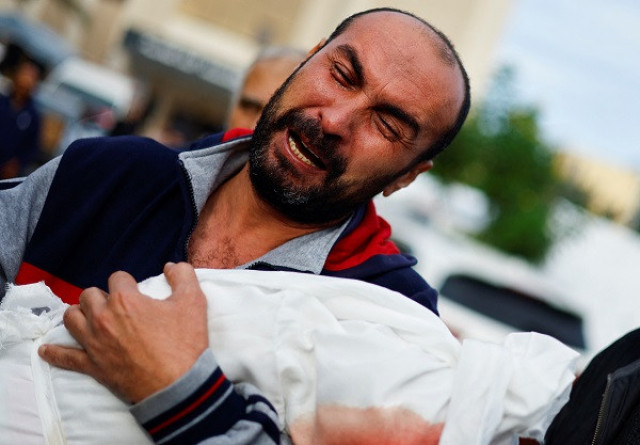As the international community bears witness to the distressing human drama unfolding in Gaza following the October 7th attacks, the reality of this war's grim toll becomes starkly clear. Observing the chaos and carnage through the detachment of media screens does little to shield one from the profound impact of such brutality.
The horrific images of casualties and the wounded of all ages, victims of the relentless Israeli bombardment over the past weeks, evoke a visceral response. This shared human experience naturally evokes a wave of empathy for the Palestinians enduring this ordeal. This sympathy has galvanised global support, manifesting in substantial public demonstrations throughout western nations. These protests not only offer solidarity with Gaza's inhabitants but also voice dissent against the pro-Israeli policies of many western governments. The unwavering backing of Israel by its western allies during this conflict highlights contentious issues of political duplicity, moral inconsistency, and the selective enforcement of human rights statutes.
Such support has seemingly emboldened the Israeli administration to dismiss ceasefire appeals made by the world at large, with a staunch commitment to suppress both the Hamas leadership and its support network in Gaza.
The Israeli military action in Gaza in the aftermath of the October 7th events has claimed 15,000 innocent human lives, besides destroying almost 50% of the residential buildings in Gaza. The majority of those killed are women, children and the elderly. The unceasing heavy bombing of Gaza has left a massive trail of destruction in its wake. Even the United Nations (UN) relief structure in the form of schools, hospitals and other humanitarian facilities in Gaza was deliberately targeted and made ineffective.
Millions of people have been forced to leave their homes in northern Gaza. The deliberate attacks and bombings against hospitals have destroyed the entire health infrastructure in Gaza. There is no end to suffering in sight for all those who have seen and experienced the misery associated with war and hatred.
The world has watched with helplessness the cruelty currently being perpetrated in Gaza. All the world powers and different groups of nations, including the UN, could not stop Israel from doing what it wanted to do in Gaza.
The recent temporary ceasefire agreement agreed to by the Israeli government, mediated by Qatar and Egypt with the support of the US, was mainly the result of Israeli public pressure on the Israeli government about the freedom of hostages held by Hamas in the October 7th raid in Israel. However, the statements from Israeli leadership, particularly Prime Minister Benjamin Netanyahu, do not offer any hope of a long-term solution to the issue. Their blind rage for revenge has made them lose sight of reason and long-term perspective.
Despite the Israeli military presence in Gaza over the weeks now, the much talked about underground city of Hamas military might is nowhere in sight, and all they have been able to find are a few guns in hospitals they raided and destroyed. We are watching the replay of the famous weapons of mass destruction story forming the basis of the destructive war pursued by the US in Iraq in the aftermath of the 9/11 events.
Israeli Prime Minister Netanyahu's characterisation of this military endeavour as a 'just war' against 'barbarism' raises critical ethical questions. If the obliteration of innocents is the accepted toll for triumph over 'evil', it blurs the moral lines between civilised values and the acts of those condemned as uncivilised.
Stripping away the bellicose rhetoric from both sides, it is the shared suffering of the conflict's victims that resonates, regardless of allegiance, with equal intensity and depth.
The genesis of this crisis is not a sudden event but the culmination of a historical continuum that traces back to post-World War II decisions. The establishment of a Jewish state within an Arab-majority territory sowed the seeds for successive Arab-Israeli conflicts. The outcome of these struggles led to Palestinian displacement and the controversial establishment and expansion of Israeli settlements, often decried by the international community yet persistently pursued by Israel.
US-led attempts at mediating the Israeli-Palestinian discord have been consistently undermined by its unequivocal support for Israel. This complicates the US's role as an unbiased intermediary and casts doubt on the efficacy of its past diplomatic endeavours. The granting of $14 billion US military aid for Israel during the current crisis speaks volumes about where its sympathies lie, and the talk of advancing and promoting peace and justice is merely an exercise in public relations.
The notion that the elimination of Hamas will extinguish Palestinian resistance is a misconception. As long as occupation persists, resistance in various forms will continue. History has shown that Israeli military actions against Hamas and other Palestinian resistance movements have seldom yielded decisive outcomes and have not quelled the Palestinian aspiration for statehood. The reliance on the military might provide a reprieve, yet historical evidence suggests it is not a sustainable solution. The only enduring resolution rests in the formation of a sovereign Palestinian state.
It is a sombre recognition that conflict invariably gives way to dialogue but at the lamentable cost of countless lives. The enduring scars of those who survive are a testament to the tragic futility of such violence.
Ultimately, the persistence of violent conflicts challenges our faith in humanity and the ideals it espouses, casting a shadow on the prospects of peace and the very concept of human dignity.



COMMENTS
Comments are moderated and generally will be posted if they are on-topic and not abusive.
For more information, please see our Comments FAQ